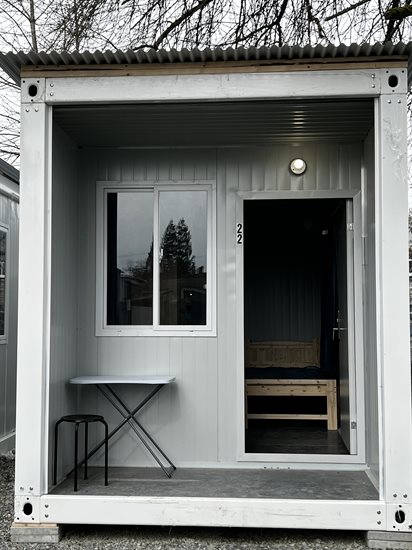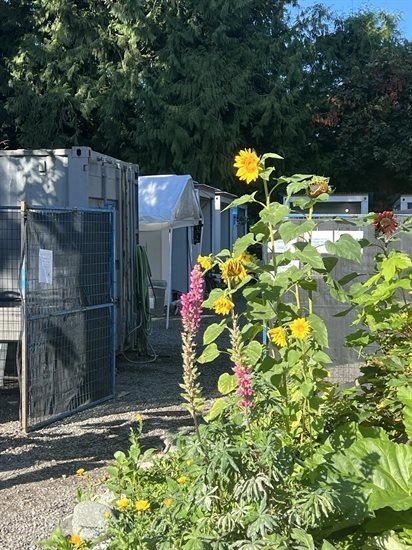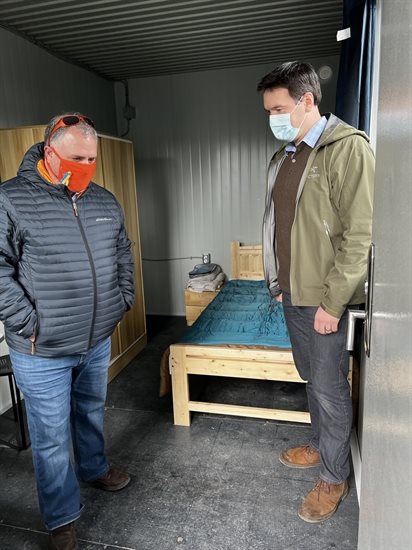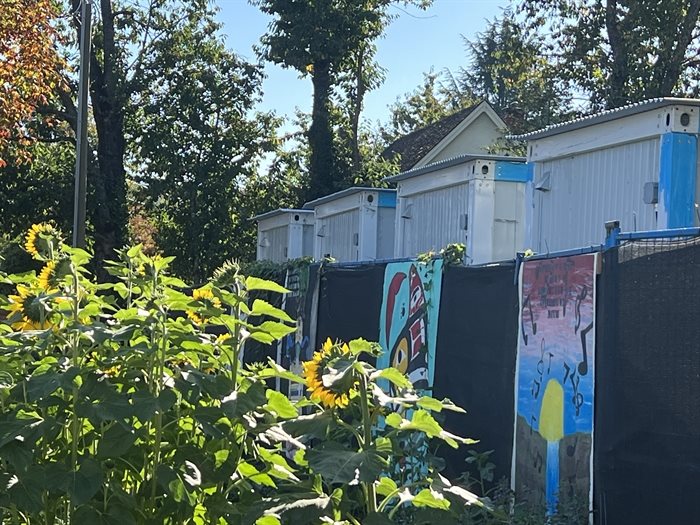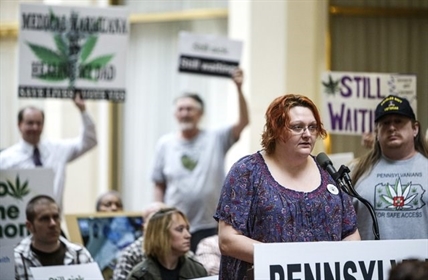Kelowna's tiny homes for the home homeless should be standard in BC: Duncan mayor

The City of Duncan pioneered what are called “tiny homes” for those living rough in their city and it’s working so well that Mayor Michelle Staples is lobbying to have the concept expanded throughout the province.
“Part of where we’re at right now is trying to work with the province of establishing this as a form of housing that is required on the continuum of housing,” Staples told iNFOnews.ca. “It’s vitally important for people to be able to come from being unhoused into being stabilized.”
Victoria and Port Alberni have picked up on the idea and Kelowna is going to install 120 of them over the next few months.
READ MORE: 120 tiny houses planned for homeless people in Kelowna
Duncan first came up with the idea in 2019 but it was rejected by BC Housing.
When COVID hit and homeless people were in need of social distancing and isolating, a task force was created that, first of all, put some folks up in hotels and others in tents, which were expected to last for 12 weeks.
“We realized winter is coming, this pandemic isn’t ending, people are not going to survive in tents and we had snowfall,” Staples said.
So, the original tiny home plans were dusted off and they were installed at five locations in the Cowichan Valley.
The current version, 3.0, is called The Village and consists of 34 units that are about 60 square feet each. It opened March 14, 2022 on land owned by BC Housing and is run by Lookout Housing and Health Society, which are on site 24/7.
They have electric heating, basic furniture like a bed and cupboard and bedding.
Staples bridled at the suggestion that they were, really, just glorified tents.
“It’s a sleeping pod,” she said. “It allows people to have a bed. It allows them to have clothes and belongings and some wall space to hang things up and a covered porch for them.”
The Village is a gated community with visitors having to go through the staff area first with three clusters of housing units reaching out, like flower petals, from there, Staples said. There are washroom and laundry facilities, meals are provided and there are gardens.
Its impact on the residents has been profound.
“The desperate need for this is the need for people to become stabilized and off the street and have an opportunity to get into a place where they’re ready for the next level of support that they need,” Staples said.
One resident, who went through rehab, is now going to college and 86% have some sort of work, whether through peer programs or things like food serving.
“There’s a whole bunch of different initiatives that have grown out of it,” Staples said. “We’re also working with WorkBC on another program for people, as they’re transitioning to gain life skills and certificates and exploration of what they want to do and able to do next. There’s a growing community investment in how do people come back into community and how people can contribute – and they really want to contribute.”
One of the toughest challenges for people sleeping rough in tents is that they have no fixed address, which limits many of their options.
The Village gives them a place where they can not only lock their doors, but they’re better able to look for work and access health care because they now have that fixed address. They can, for example, get surgeries because they now have a place to recover in.
“People are stabilizing in this site,” Staples said. “Their drug use is going down considerably. People are going on to (opioid agonist) therapies and different things. This is about helping people to become well, not just giving them a place to live.”
It has not come without difficulties. Part of that is the temporary nature of the sites where there has been opposition from neighbours each time temporary use permits were renewed.
“One key component to this is to have really strong community agreements with the people on site and strong neighbourhood agreements,” Staples said. “How are you going to be in your neighbourhood? How are you going to work with your neighbours? What’s expected of you?”
Opposition seems to have tapered off, Staples said. Residents are screened before being accepted and neighbourhood committees have been set up
“One of the things we have to accept is, it’s not going to be perfect,” Staples said. “So how do we adapt, learn, grow and change and continue to do that? Just because something happens that is negative doesn’t mean everything should stop because, what’s happening now with people being unhoused, that’s not acceptable at all. No one wants that to continue.”
The Village is still operating on short term six- to 12-month- funding and sits on land that BC Housing, ultimately, has other plans for.
Staples wants a permanent location and would welcome the three-year funding that’s been provided for the Kelowna project.
“The more sites we can get supported across the province at this point in time allows us to really study them and to gain confidence with the communities, but also with BC Housing,” she said.
Staples wants to do a cost benefit analysis to show the financial effectiveness of this kind of housing. People, for example, are better able to access health care services so they make fewer costly trips to hospital emergency rooms.
READ MORE: Homeless campers and children’s parks don’t mix in Vernon
She would also like to grow the site to 40 units, set up sites geared to seniors and to have some larger units.
“People start with the small unit that they have now, then they can transition into a unit that has a kitchen where they can learn the skills of managing budgets and cooking and getting comfortable with that before they move into their own apartment or shared space or supportive housing and, if they’re not quite ready, then they come back,” Staples said.
To contact a reporter for this story, email Rob Munro or call 250-808-0143 or email the editor. You can also submit photos, videos or news tips to the newsroom and be entered to win a monthly prize draw.
We welcome your comments and opinions on our stories but play nice. We won't censor or delete comments unless they contain off-topic statements or links, unnecessary vulgarity, false facts, spam or obviously fake profiles. If you have any concerns about what you see in comments, email the editor in the link above. SUBSCRIBE to our awesome newsletter here.


